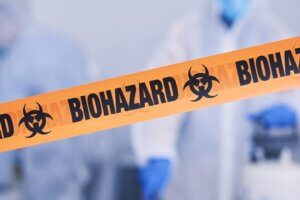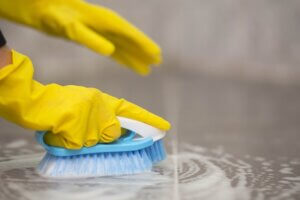BLOG

Can Trauma Cleaning Be Done Without Specialist Equipment?
Can Trauma Cleaning Be Done Without Specialist Equipment?
Trauma cleaning is no ordinary task. It’s confronting, often distressing and absolutely essential in the aftermath of tragic events. Unlike your regular house clean-up, this job involves hazardous materials like blood, bodily fluids and sometimes even biohazard waste. Understandably, people often wonder if trauma cleaning can be done without specialist equipment.
Usually, when faced with a trauma scene, emotions run high and decisions can feel overwhelming. Choosing whether to take on the job yourself or hire a professional isn’t just about cost; it’s about safety, legality and peace of mind. While you might think that a few heavy-duty gloves and some bleach could do the trick, the reality is much more complex.
Let’s dig deeper and uncover whether trauma cleaning is ever safe or practical without professional tools and expertise.
Understanding The Risks Involved

Truthfully, trauma cleaning isn’t just gross, it’s dangerous. Biological contaminants pose serious health risks, from viruses like hepatitis B and C to bacterial infections like MRSA. You can’t always see the threat, but it’s there and it’s not forgiving.
Often, people underestimate the gravity of exposure to pathogens. Even a minor cut can become a doorway for infection if proper barriers aren’t in place. Plus, biohazards linger on surfaces long after visible messes are gone. Household cleaning agents and equipment just aren’t designed to handle these contaminants.
Moreover, improper trauma cleaning can lead to cross-contamination. One wrong move and you could be spreading harmful substances throughout the space—or worse, your home. With the stakes so high, it becomes obvious why this job often requires more than elbow grease and household sprays.
Why Specialist Equipment Matters
Actually, professional trauma cleaners use equipment specifically engineered for biohazard remediation. High-efficiency particulate air (HEPA) filters, ozone generators and hospital-grade disinfectants are just a few tools in their arsenal. These aren’t luxury items—they’re necessities.
Standard vacuums, mops and sprays just don’t cut it when dealing with deeply penetrated blood stains or lingering odours. HEPA-filtered vacuums can trap microscopic pathogens that regular vacuums would just blow back into the air. Additionally, foggers and ozone machines neutralise harmful airborne particles that you wouldn’t even know were there.
Furthermore, safety gear plays a major role. Professionals suit up in full PPE—coveralls, respirators and face shields (to shield themselves from exposure). If you attempt trauma cleaning without this gear, you’re essentially walking into a battlefield unarmed. No gloves or face mask from your local chemist will provide adequate protection.
Legal And Emotional Considerations

Certainly, it’s not just about cleanliness – there’s a legal angle to consider too. In many parts of Australia, handling biohazard waste without a proper license can result in fines or legal issues. Trauma cleaning professionals are trained and certified, ensuring that they follow government regulations every step of the way.
Emotionally, it’s a different kind of toll. Trauma scenes are often linked to deeply personal and tragic events. Cleaning these areas without proper mental preparation or detachment can reopen emotional wounds, making healing even harder. Professionals are trained to work with compassion while maintaining the distance needed to perform effectively.
Often, people who try to take on trauma cleaning themselves later admit that it added to their trauma rather than resolved it. There’s no shame in needing help, especially when the job requires not just physical tools, but mental and emotional strength too.
Is DIY Trauma Cleaning Ever An Option?
Realistically, for very minor incidents – say, a small cut or spill – you might manage with basic cleaning. However, this doesn’t fall under trauma cleaning in the traditional sense. Once you’re dealing with any scene involving death, bodily fluids or crime, DIY becomes risky and unwise.
Sometimes people are tempted to save money by tackling trauma cleaning themselves. But ask yourself this: what’s the cost of doing it wrong? Health complications, emotional distress and legal trouble aren’t worth a few saved dollars. Hiring professionals doesn’t just guarantee a cleaner home – it ensures a safer, more dignified recovery process.
Finally, trauma cleaning experts bring more than gear – they bring experience. They know where to look, what to clean and how to ensure the space is truly safe for living again. No YouTube tutorial or supermarket cleaner can compete with that.
The Verdict On DIY

Ultimately, while the idea of handling trauma cleaning on your own might seem doable in theory, the practical and emotional realities tell a different story. Without the right equipment, training and psychological distance, you’re putting yourself at risk – and potentially compromising the safety of others too.
So, can trauma cleaning be done without specialist equipment? Technically, in extremely limited and minor cases, maybe. But in almost every real-world situation, the answer is a firm no. Trust the pros; your health, your home and your peace of mind are worth it.
Professional Trauma Cleaning
Don’t risk a DIY trauma clean – for peace of mind, speak to the team at National Trauma (NTCSC). With over 30 years’ experience and safe, thorough cleaning practices, we’re here to help with all challenging trauma cleaning situations. Our compassionate team are ready to assist anytime 24/7 day. Give us a call for all your professional trauma cleaning needs.